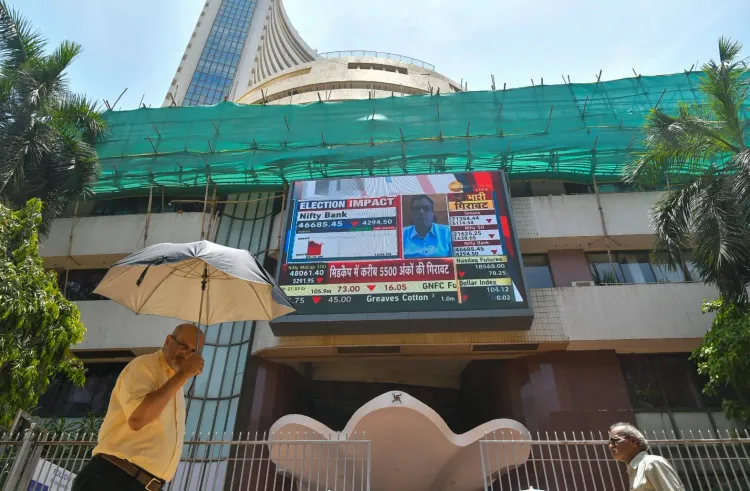Is the Indian Stock Market Rising Despite US Tariff Concerns?

Synopsis
Key Takeaways
- Sensex closed slightly higher at 80,623.26.
- Market volatility was influenced by US tariff concerns.
- Late-session gains in banking and IT sectors propelled the market.
- The rupee remains stable at 87.67.
- Experts suggest monitoring ongoing tariff impacts.
Mumbai, Aug 7 (NationPress) The Indian stock market closed with slight gains on Thursday following a day filled with significant fluctuations, largely brushing aside the new tariff concerns expressed by US President Donald Trump.
While stocks in the textiles, jewellery, and auto ancillaries sectors, which are sensitive to US exports, faced challenges, the late-session recovery in banking, FMCG, and IT stocks pushed the market into positive territory.
The Sensex concluded at 80,623.26, marking an increase of 79.27 points or 0.10 percent. The 30-share index began the day in negative territory at 80,262.98, following the previous day's close of 80,543.99, reacting to Trump's tariff announcements. However, it rebounded, reaching an intra-day peak of 80,737.55 amid buying activity in heavyweight stocks within the IT and banking sectors during the afternoon.
The Nifty index wrapped up at 24,596.15, up 21.95 or 0.09 percent.
Vikram Kasat, Head of Advisory at PL Capital, noted, "Initial concerns regarding Donald Trump’s renewed tariff threats—suggesting a 25 percent additional tax on Indian imports—were largely mitigated by the market. Sectors heavily reliant on US exports such as textiles, jewellery, and auto ancillaries faced headwinds, but a late-session rally in banking and FMCG stocks helped counterbalance broader declines."
Among the Sensex constituents, Tech Mahindra, Eternal, HCL Tech, Axis Bank, HDFC Bank, Maruti Suzuki, and Tata Steel finished in the green, while Trent, Hindustan Unilever, Mahindra and Mahindra, Kotak Bank, NTPC, and Tata Motors were among the biggest losers.
Despite the volatility, most sectoral indices concluded the trading session positively, buoyed by value buying across various sectors. The Nifty Financial Services index rose by 32 points, while the Bank Nifty gained 110 points or 0.20 percent. The Nifty Auto index increased by 59 points or 0.25 percent, the Nifty IT index surged by 300 points or 0.87 percent, and the Nifty FMCG index closed up 67 points or 0.12 percent.
Vinod Nair, Head of Research at Geojit Investments Limited, commented, "Domestic equities rebounded sharply from intraday lows during a volatile weekly expiry day. Although the earlier trading session faced pressure from widespread selling due to steep US tariff hikes on India, sentiment improved towards the close as rumors of potential peace talks involving Trump, Putin, and Zelensky emerged, raising hopes for a more lenient US trade stance."
The broader market mirrored this trend as well, with the Nifty Small Cap 100 gaining 30 points, the Nifty Midcap 100 climbing by 188 points, the Nifty 100 closing 28 points higher, and the Nifty Next 50 concluding the session up by 156 points.
The rupee remained stable within a narrow range, trading slightly higher at 87.67.
Jateen Trivedi from LKP Securities stated, "Despite a slight increase, the overall trend remains weak due to the ongoing US-imposed tariffs on Indian goods, which have significantly impacted the rupee over the past four months, causing it to drop from 84.50 to 87.70."









